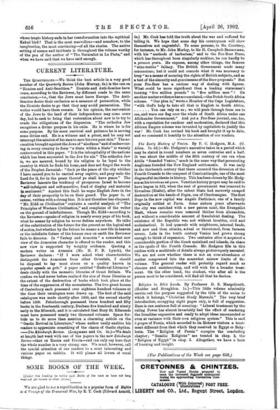C URRENT LITERATURE.
THE QUARTERLIES.—We think the best article in a very good number of the Quarterly Review (John Murray, 6s.) is the one on "Zionism and Anti-Semitism." Zionists and Anti-Semites have come, according to the Reviewer, by different roads to the same conclusion,—i.e., that the Jews must leave Europe. The Anti- Semites desire their exclusion as a measure of persecution, while the Zionists desire to go that they may avoid persecution. The writer would have them remain. In his opinion, the restoration of the Jews to the land of their independence may come some day, but to seek to bring that restoration about now is to try to evade the obligations of the dispersion. "The orthodox Jew recognises a divine purpose in his exile. He is where he is for some purpose. By his mere survival and patience he is serving some divine end. He is a witness and a priest, and he may not interrupt the mission of his race to save his own poor skin." The ac- cusation brought against the Jews of" aloofness "and of endeavour- ing in every country to form "a State within a State" is warmly controverted in this paper. "It is the inhospitality of the nations which has been accounted to the Jew for sin." The orthodox Jew is, we are assured, bound by his religion to be loyal to the country in which be finds his home, and does not forget the words of the Prophet Jeremiah : "Seek ye the peace of the city whither I have caused you to be carried away captive, and pray unto the Lord for it, for in the peace thereof ye shall have peace." The Reviewer laments the tendency of prosperous Israel to become • self-indulgent and self-assertive, fond of display and material In sentiment." Against this fault he urges English Jews in the day of their prosperity to be on their guard. The paper is, of course, written with a strong bias. It is not therefore less eloquent. "Mr. Kidd on Civilisation" contains a careful analysis of "The Principles of Western Civilisation,' and complains of the writer on the ground of indefiniteness. Though Mr. Kidd—according to the Reviewer—speaks of religion in nearly every page of his book, what he means by religion he never defines anywhere. He talks of the substitution of the future for the present as the logical end of action, but whether by the future he means a new life in heaven or the indefinite future of the human race on earth the Reviewer fails to discover. In "Turkey and Armenia" a somewhat new view of the Armenian character is offered to the reader, and this new view is supported by weighty evidence. Quoting a modern writer on Armenia (Mr. H. F. B. Lynch), the Reviewer declares : "If I were asked what characteristics distinguish the Armenian from other Orientals, I should be disposed to lay most stress on a quality known in popular speech as grit." A paper entitled "Medieval Libraries" deals chiefly with the monastic libraries of Great Britain. We confess we had never before realised the size of these libraries or the extent of the destruction of books which took place at the time of the suppression of the monasteries. The two great houses of Canterbury each possessed over eighteen hundred volumes at the time their catalogues were drawn up. The first of the said catalogues was made shortly after 1300, and the second shortly before 1500. Peterborough possessed three hundred and fifty books in the fourteenth century, Durham five hundred and ninety early in the fifteenth, and it is calculated that Bury St. Edmunds must have possessed nearly two thousand volumes. Space for- bids us to do more than mention a charming article on the "Gaelic Revival in Literature," whose author really enables his readers to appreciate something of the charm of Gaelic rhythm. —The Edinburgh Review. (Longnaans and Co. 6s.)—We dealt at length last week with one of the papers in the new Edinburgh Review—.that on Russia and Persia—and can only say here that the whole number is a very strong one. We must, however, call the special attention of our readers to a most interesting and curious paper on rabbits. It will please all lovers of rural things.


























































 Previous page
Previous page